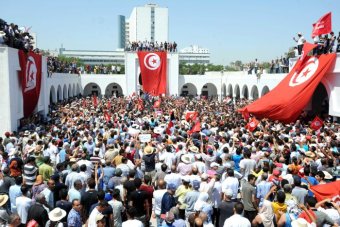A Tunisian national dialogue, which is the centerpiece of a plan to end the political paralysis gripping the country since the July assassination of opposition MP Mohammad Brahmi, has been put back to Friday.
 A Tunisian national dialogue, which is the centerpiece of a plan to end the political paralysis gripping the country since the July assassination of opposition MP Mohammad Brahmi, has been put back to Friday.
A Tunisian national dialogue, which is the centerpiece of a plan to end the political paralysis gripping the country since the July assassination of opposition MP Mohammad Brahmi, has been put back to Friday.
The roadmap, drawn up mediators led by the UGTT, ran into trouble when Islamist Prime Minister Ali Larayedh gave what the opposition described as an "ambiguous" commitment to step down in a speech late on Wednesday.
"We repeat today our commitment to the principle of relinquishing power in line with the different phases envisaged in the roadmap," Larayedh said after an emergency cabinet meeting.
"We will not submit to anyone except the interests of the country," he added, in a heavily delayed statement that was supposed to precede the launch of the national dialogue.
The opposition had been waiting for a "clear commitment" by Larayedh to resign within three weeks, as stipulated in the roadmap drawn up by mediators and agreed to by his Islamist party Ennahda, to allow the national dialogue to begin.
According to the roadmap, the talks must lead within three weeks to the formation of a caretaker cabinet of technocrats.
Negotiators will also have one month to adopt a new constitution, electoral laws and a timetable for fresh elections -- key milestones in a transition that has effectively been blocked by wrangling between the Islamists, their coalition allies and the opposition.
Meanwhile, Tunisians on Thursday mourned six policemen killed in a firefight with suspected extremists, as long-awaited crisis talks faced fresh delay over opposition doubts about the ruling Islamists' readiness to quit.
The slain police were to be buried later Thursday in home towns around Tunisia, including in the central Sidi Bouzid region where Wednesday's clash broke out, amid rising anti-government sentiment within the security forces.
President Moncef Marzouki has declared three days of national mourning for the officers.
The powerful UGTT trade union confederation called a strike in Sidi Bouzid, the poor central town where the uprising that toppled strongman Zine El Abidine Ben Ali in 2011 first began.
